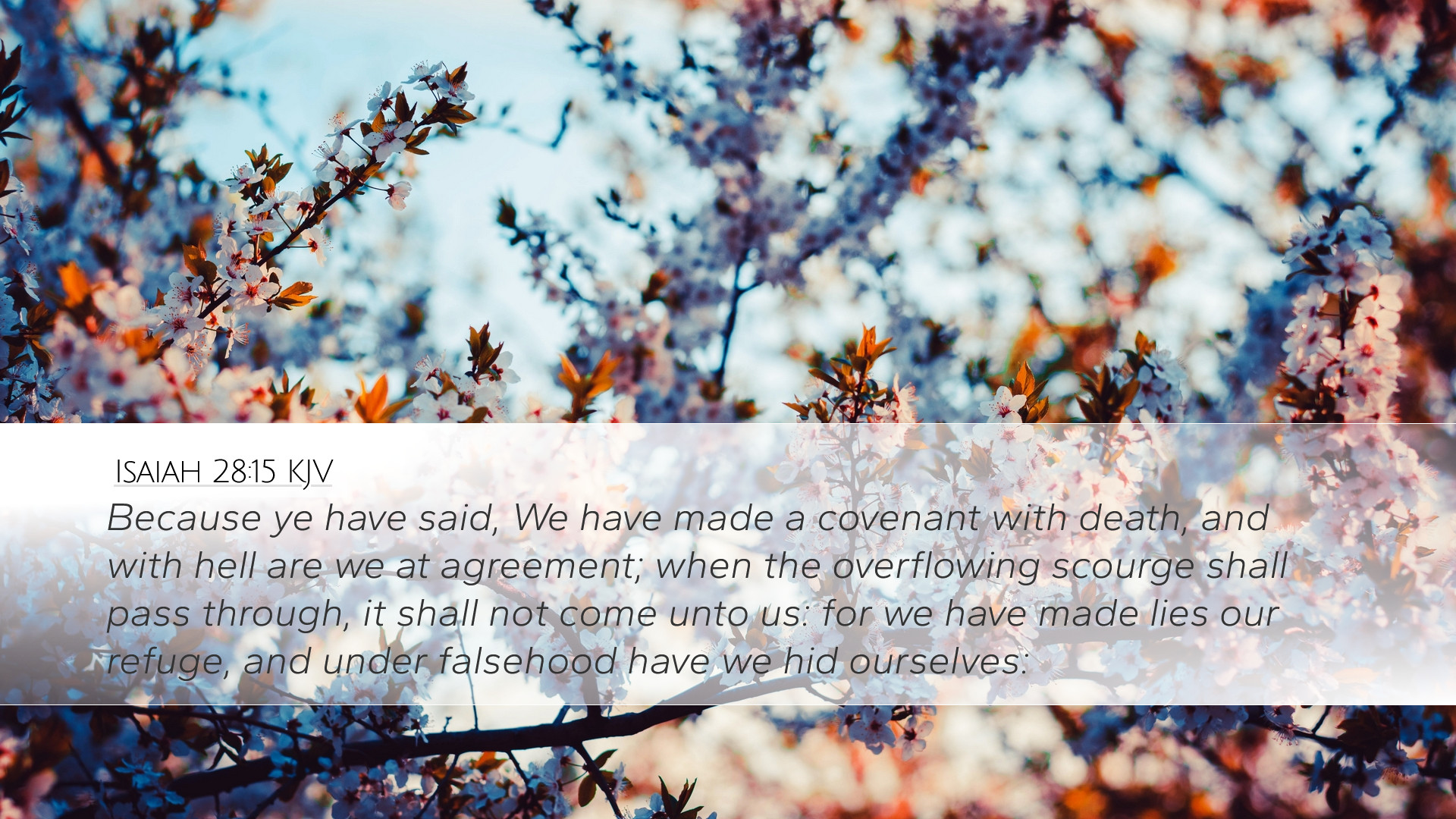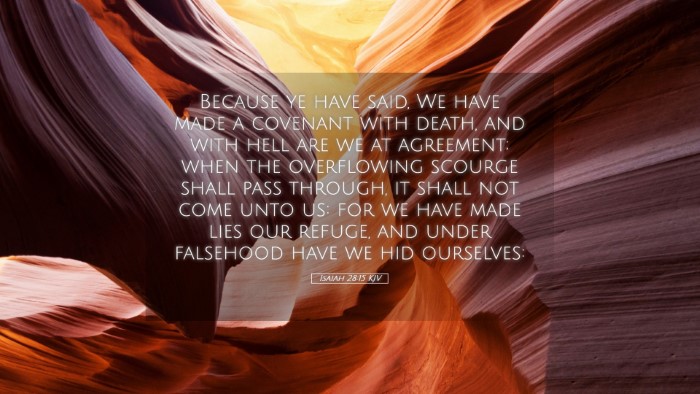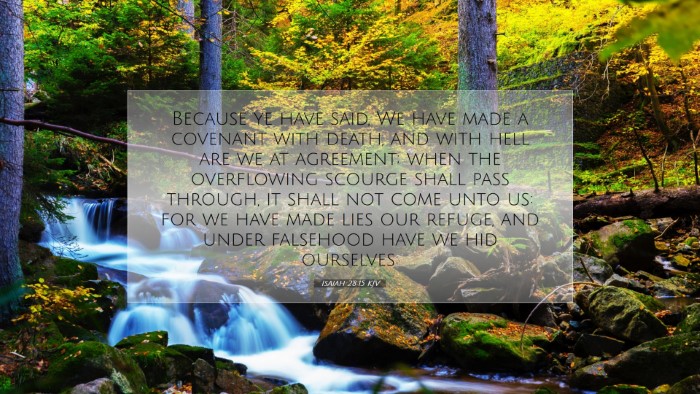Commentary on Isaiah 28:15
Verse Text: “Because ye have said, We have made a covenant with death, and with hell are we at agreement; when the overflowing scourge shall pass through, it shall not come unto us: for we have made lies our refuge, and under falsehood have we hid ourselves.”
Context and Background
This verse is situated in a critical passage of the Book of Isaiah, where God, through the prophet, addresses the leaders of Ephraim and Jerusalem.
The "covenant with death" symbolizes a false sense of security amidst impending judgment, representing the erroneous reliance on earthly alliances and political expedience.
As we delve into the nuances of Isaiah 28:15, it becomes clear that the prophet highlights the futility of human stratagems against divine retribution.
The historical context implies a period of moral decay and spiritual irresponsibility among the Israelites, who resolve that their cleverness can shield them from consequences.
Commentary Insights
Matthew Henry's Commentary
Matthew Henry emphasizes the folly and danger of the Israelites' reliance on their crafted agreements, delineating how they believed that their pacts could exempt them from divine justice.
He points out that “a covenant with death” signifies an attempt to make peace with inevitable destruction, suggesting a delusion that their schemes can alter the course of divine will.
Henry also remarks on the spiritual blindness of the people, as they seek refuge not in truth but in “lies,” highlighting the gravity of their misplaced trust.
He exhorts that, relying on falsehood leads not only to temporal vulnerabilities but ultimately to spiritual demise.
Albert Barnes' Notes on the Bible
Albert Barnes interprets the verse with a specific focus on the consequences of the covenant made with death. He notes that it was an expression of a misguided reliance, which ultimately places those who believe it in a precarious position when faced with disaster.
Barnes elaborates that their assertion, “when the overflowing scourge shall pass through,” reveals a profound lack of understanding of God’s judgments, leading to a false confidence in human arrangements.
He insists that such an alliance against providential judgment is not only a condemnation of their political choices but also a rejection of God’s sovereignty, urging theologians to reflect on the implications of human wisdom contrasted against divine authority.
Adam Clarke's Commentary
Adam Clarke approaches the verse with emphasis on the concept of making “lies” a refuge, bringing to light the spiritual implications of such deception.
He interprets this as a metaphor for any false security that people might construct around themselves, whether political, economic, or social.
Clarke observes that the people tend to hide behind such falsehoods rather than confronting their plight honestly before God.
This observation sets the stage for a vital teaching for pastors and students of scripture on the importance of authenticity in one's relationship with God.
Furthermore, Clarke theorizes that the reference to “hell” in the covenant signifies a readiness to accept spiritual death as long as their physical existence is shielded from present threats.
This duality indicates the peril of prioritizing earthly securities over spiritual integrity, ultimately leading to divine judgment.
Theological Implications
Theologically, Isaiah 28:15 interrogates the intersection of human agency and divine sovereignty. It invites pastors and scholars to consider the necessary disposition of faith in light of calamity and judgment.
- Human Efforts vs Divine Will: The verse prompts a reflection on the limits of human wisdom in the face of divine justice.
- The Nature of True Refuge: A critical understanding of where believers should find safety is explored, emphasizing that genuine refuge lies in truth over falsehood.
- Judgment and Grace: Despite the grim declaration of judgment, this passage also provides an invitation to repentance, pointing towards God's grace for those who turn to Him.
Practical Applications
For contemporary readers, Isaiah 28:15 serves as a poignant reminder to evaluate the foundational truths upon which their lives are built. The following applications emerge:
- Self-Examination: Believers are urged to assess whether they have built their lives on the truths of God or upon shifting sands of lies and falsehoods.
- Courage in Truth: In times of crisis, faith leaders must encourage their congregants to embrace the truth of God’s promises, standing firm rather than seeking false securities.
- Teaching Integrity: It is vital for pastors to instantiate the reality of God’s justice balanced with His mercy in their sermons, helping the community navigate through fears and uncertainties with hope rooted in truth.
Conclusion
Isaiah 28:15 is a sobering proclamation that challenges any erroneous thinking regarding the security offered by human schemes.
Reflections from public domain commentaries provide a multi-faceted insight that can enrich the understanding of pastors, students, and all scholars of scripture.
Ultimately, this passage invites a faithful re-examination of where one places hope and builds trustworthy foundations for living out the faith.


